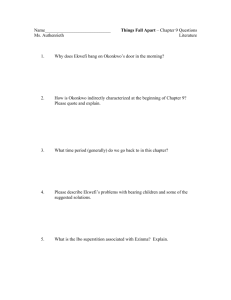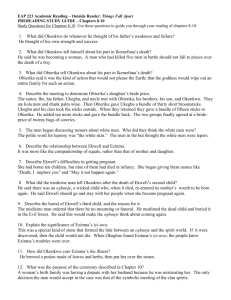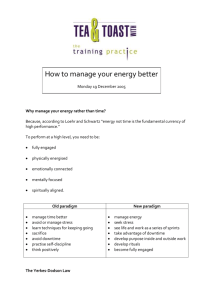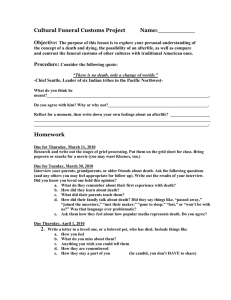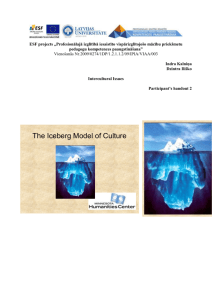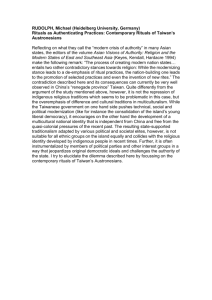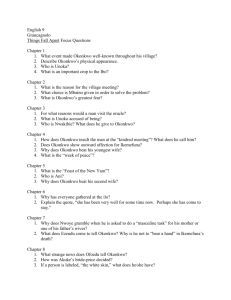Nicola Harris Appendices
advertisement
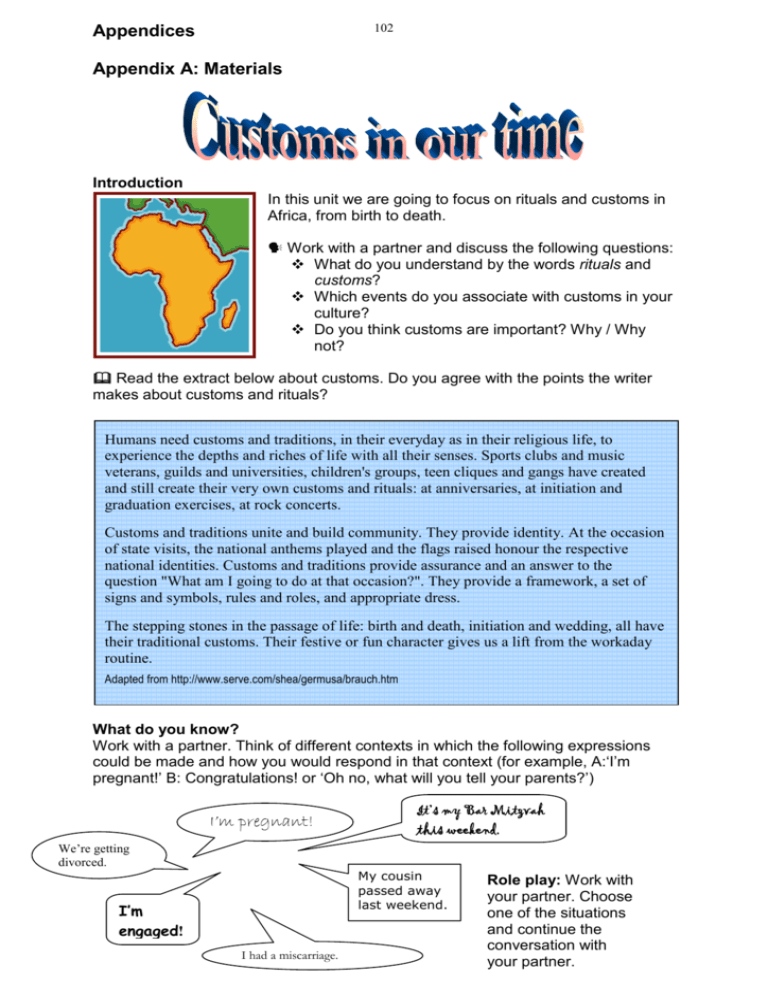
102 Appendices Appendix A: Materials Introduction In this unit we are going to focus on rituals and customs in Africa, from birth to death. Work with a partner and discuss the following questions: What do you understand by the words rituals and customs? Which events do you associate with customs in your culture? Do you think customs are important? Why / Why not? Read the extract below about customs. Do you agree with the points the writer makes about customs and rituals? Humans need customs and traditions, in their everyday as in their religious life, to experience the depths and riches of life with all their senses. Sports clubs and music veterans, guilds and universities, children's groups, teen cliques and gangs have created and still create their very own customs and rituals: at anniversaries, at initiation and graduation exercises, at rock concerts. Customs and traditions unite and build community. They provide identity. At the occasion of state visits, the national anthems played and the flags raised honour the respective national identities. Customs and traditions provide assurance and an answer to the question "What am I going to do at that occasion?". They provide a framework, a set of signs and symbols, rules and roles, and appropriate dress. The stepping stones in the passage of life: birth and death, initiation and wedding, all have their traditional customs. Their festive or fun character gives us a lift from the workaday routine. Adapted from http://www.serve.com/shea/germusa/brauch.htm What do you know? Work with a partner. Think of different contexts in which the following expressions could be made and how you would respond in that context (for example, A:‘I’m pregnant!’ B: Congratulations! or ‘Oh no, what will you tell your parents?’) I’m pregnant! It’s my Bar Mitzvah this weekend. We’re getting divorced. My cousin passed away last weekend. I’m engaged! I had a miscarriage. Role play: Work with your partner. Choose one of the situations and continue the conversation with your partner. 103 Reading and vocabulary You are going to read an extract from a book called Things Fall Apart by Chinua Achebe. Chinua Achebe is one of Africa's most influential and widely published writers. He has written twenty-one novels, short-stories and collections of poetry. He was 28 when his first and best-known post-colonial landmark novel, Things Fall Apart (1958) was published and this has proved popular not just in Nigeria, but throughout Africa and the rest of the world. Work with a partner. Before you read, discuss what you know about Nigeria and the rituals and customs practised in this country. 1. In the extract there are three main characters – Okonkwo (the father), Ekwefi (one of his wives), and Ezinma (the daughter). Read the story below and discuss with your partner which character you like the most and why. Vocabulary strategy Remember that you don’t need to understand every word in the text to understand what’s going on. Strategy: If you don’t understand an important word in the text try to work out the meaning from the context before reaching for your dictionary. Things Fall Apart (By Chinua Achebe) For the first time in three nights, Okonkwo slept. He woke up once in the middle of the night and his mind went back to the past three days without making him feel uneasy. He began to wonder why he had felt uneasy at all. It was like a man wondering in broad daylight why a dream had appeared so terrible to him at night. He stretched himself and scratched his thigh where a mosquito had bitten him as he slept. Another one was wailing near his right ear. He slapped the ear and hoped he had killed it. Why do they always go for one's ears? When he was a child his mother had told him a story about it. But it was as silly as all women's stories. Mosquito, she had said, had asked Ear to marry him, whereupon 1 104 Ear fell on the floor in uncontrollable laughter. "How much longer do you think you will live?" she asked "You are already a skeleton." Mosquito went away humiliated, and any time he passed her way he told Ear that he was still alive. 14 Okonkwo turned on his side and went back to sleep. He had been dreaming of his childhood when he was roused by someone banging on his door. "Who is that?" he growled. He knew it must be Ekwefi. Of his three wives Ekwefi was the only one who would have the audacity to bang on his door. 18 "Ezinma is dying," came her voice, and all the tragedy and sorrow of her life were packed in those words. Okonkwo sprang from his bed, pushed back the bolt on his door and ran into Ekwefi's hut. Ezinma lay shivering on a mat beside a huge fire that her mother had kept burning all night. 24 "it is iba," said Okonkwo as he took his machete and went into the bush to collect the leaves and grasses and barks of trees that went into making the medicine for iba. Ekwefi knelt beside the sick child, occasionally feeling with her palm the wet, burning forehead. 29 Ezinma was an only child and the centre of her mother's world. Very often it was Ezinma who decided what food her mother should prepare. Ekwefi even gave her such delicacies as eggs, which children were rarely allowed to eat because such food tempted them to steal. One day as Ezinma was eating an egg Okonkwo had come in unexpectedly from his hut. He was greatly shocked and swore to beat Ekwefi if she dared to give the child eggs again. But it was impossible to refuse Ezinma anything. After her father's rebuke she developed an even keener appetite for eggs. And she enjoyed above all the secrecy in which she now ate them. Her mother always took her into their bedroom and shut the door. 39 Ezinma did not call her mother Nne like all children. She called her by her name, Ekwefi, as her father and other grown-up people did. The relationship between them was not only that of mother and child. There was something in it like the companionship of equals, which was strengthened by such little conspiracies as eating eggs in the bedroom. 44 Ekwefi had suffered a good deal in her life. She had borne ten children and nine of them had died in infancy, usually before the age of three. As she buried one child after another her sorrow gave way to despair and then to grim resignation. The birth of her children, which should be a woman's crowning glory, became for Ekwefi mere physical agony devoid of promise. The naming ceremony after seven market weeks became an empty ritual. Her deepening despair found expression in the names she gave her children. One of them was a pathetic cry, Onwumbiko "Death, I implore you." But Death took no notice; Onwumbiko died in his fifteenth month. The next child was a girl, Ozoemena - "May it not happen again." She died in her eleventh month, and two others after her. Ekwefi then became defiant and called her next child Onwuma - "Death may please himself-" And he did. 55 After the death of Ekwefi's second child, Okonkwo had gone to a medicine man, who was also a diviner of the Afa Oracle, to inquire what was amiss. This man 105 told him that the child was an ogbanje, one of those wicked children who, when they died, entered their mothers' wombs to be born again. 59 "When your wife becomes pregnant again," he said, let her not sleep in her hut. Let her go and stay with her people. In that way she will elude her wicked tormentor and break its evil cycle of birth and death.” Ekwefi did as she was asked. As soon as she became pregnant she went to live with her old mother in another village. It was there that her third child was born and circumcised on the eighth day. She did not return to Okonkwo's compound until three days before the naming ceremony. The child was called Onwumbiko…….. 3. Work in pairs. Read the text again and answer the following questions: a) What adjective(s) would you use to describe the following relationships in the family? Use the adjectives in the box to help you. Okonkwo’s and Ekwefi’s relationship? Okonkwo’s and Ezinma’s relationship? Ezinma’s and Ekwefi’s relationship? tense relaxed difficult loving understanding b) How did Okonkwo feel in the following situations? Draw in his expressions. i) When he woke up in the middle of the ii) When Ekwefi woke him up? night? iii) When Ekwefi told him that Ezinma was dying? iv) When he caught Ezinma eating eggs? c) What characteristics and behaviours does the writer suggest are unusual about Ezinma compared to other children in the village? d) What names does Ekwefi give her children? How do these names reflect her changing feelings from sorrow to despair to grim resignation? 106 4. Work with a partner. Can you guess what the words in bold mean? a) But it was as silly as all women’s stories. (line 9) b) Of his three wives Ekwefi….the audacity to bang on his door. (line 17) c) Ezinma lay shivering on a mat….(line 22) d)…..such food tempted them to steal. (line 32) e) …..to enquire what was amiss. (line 56) f) …..she will elude her wicked tormentor…..(lines 60 - 61) Check your answers in a dictionary 5. Spend a few minutes thinking about how you would answer the following questions, then discuss your answers in small groups. Name some of the customs and rituals practised in this family. For each custom, what role do each of the family members have (i.e. Okonkwo, Ekwefi and Ezinma)? Who has more power? How do you know? Name some of the customs and rituals practised in your family. For each custom, what roles do men, women and children have? Who has more power? How do you know? What, if anything would you change about your customs? What would you like future children to learn from these customs? LANGUAGE FOCUS: Narrative Tenses Work in pairs. Look at the verbs highlighted in the following sentences from the story. Then complete the table below. a) b) c) He scratched his thigh where a mosquito had bitten him as he slept. Another one was wailing near his right ear. He had been dreaming of his childhood when he was roused by someone banging on his door. Past Simple Past Continuous Verb + ed (regular verbs) He scratched ed Past Perfect Simple a) b) c) Past Perfect Continuous Which verb form describes the main events in the story? Which verb form describes an activity which was in progress at the time of the story? Which form describes the events which happened before the main events in the story? Check your answers in the Language Summary on page 6. 107 LANGUAGE SUMMARY Narrative Tenses Past Simple Past Continuous Verb + ed (regular verbs) He scratched ed was / were + -ing Another one was wailing ing Past Perfect Simple Past Perfect Continuous had + past participle a mosquito had bitten had + been + -ing ing He had been dreaming ing 1. Past Simple and Past Continuous The past simple describes the main events in a past narrative. He scratched his thigh where a mosquito had bitten him as he slept. X Past now The Past continuous describes actions in progress at the time that the main events happen. Another one was wailing near his right ear. X---------Past now 2. Past Perfect Simple and Past Perfect Continuous Both these tenses describe events before the events in the main narrative. They are ‘the past of the past.’ He scratched his thigh where a mosquito had bitten him as he slept. X X Before the past now The Past perfect continuous emphasises the duration of an event, and often describes actions which continue up until the main past events. He had been dreaming of his childhood when he was roused by someone banging on his door. Past now Practice 1. Ezinma told a friend about the day her father caught her eating eggs. Read the first part of her story and choose the correct verb form. I remember that day……I’d been playing / was playing outside all day when my mother had called / called me in. I was surprised / had been surprised when she had given / gave me a perfect boiled egg. Of course I immediately peeled / was peeling off the shell. I took / was taking a bite. Mmmm…..it had been / was delicious. I was / was being in heaven and so I hadn’t noticed / didn’t notice that pa had entered / was entering the room. He looked / was looking completely shocked. (listening 1, p. 6) Listen to check your answers. 108 Pronunciation 1 a Listen again to the first sentence of the story. Notice how the most important words are stressed, and where the speaker pauses (//). I remember that day……I’d been playing outside all day// when my mother called me in. b Listen to the next sentence and underline the stressed words. I was surprised // when she gave me // a perfect boiled egg. c Which words do you think will be stressed in this sentence? Listen and check. Of course I immediately peeled off the shell. 2 Work in pairs. Practise reading the three sentences together, paying attention to the stress. Then read the rest of the story and underline the words that should be stressed, and where you think there should be pauses. 2. How do you think Ezinma completes her story? a Imagine the ending. Then write the end of her anecdote giving two verb choices (as in exercise 1 on page 6). b Swap with your partner and circle the form you think is correct. c Ask your partner to correct your work. Practice continued …… 3. Imagine you are Okonkwo or Ekwefi and you want to tell your friend the ‘eating eggs’ story from your perspective. a. Spend a few minutes planning what you are going to say. b. Tell your story to your partner. Your partner needs to listen and ask you questions as a friend would. Why were you so angry Okonkwo? Which story did you find the most unusual, exciting or interesting? c. Write your story in 200 words. Ekwefi had suffered a good deal in her life…… The naming ceremony after seven market weeks became an empty ritual. Introduction The three pictures represent ‘birth’ in different cultures. Work with a partner and discuss what you think the symbols represent. a.______________ b. ______________ (Check your answers at the bottom of page 8). c. ______________ d. 109 Listening and Speaking: Naming Ceremonies We all have a name. In some cultures baby-naming ceremonies are practiced to give a new baby an appropriate name. 1. Work in small groups and discuss what types of baby-naming ceremonies are practised in your culture. Draw or paste in a picture that represents birth to you in box (d) on page 7. 2. Work in pairs. Look at the picture of baby Zayyaan and answer the following questions: How old do you think he is? What do you think his name means? Do you think his family practised any rituals or customs when they named him? 3. (Listening 2, p.8) Listen to an interview with Zayyaan’s mother, Sham, and check your answers to exercise 2 above. 4. Listen to the interview again and answer the following questions. a) Who chose the name Zayyaan and how was it chosen? b) What, if any, role did the father play in Zayyaan’s birth and in his naming? c) What, if any, role did his mother play? d) Would Sham change anything about how her son was named? If so, what? e) What symbols, pictures, or signs does Sham think of when she thinks of this naming ritual? Why? f) What do you think the food represents in the picture? Compare your answers with a partner. 5. Spend a few minutes thinking about how you would answer the following questions, then discuss your answers in small groups. Were you named after anyone? If so, who? Do you like your name? Why / Why not? What does your name tell other people about you? (think about gender, age, race, culture, religion etc). Create a poster Collect words, pictures, colours and images from newspapers and magazines that represent you. Make a poster and present it to your group. Tell your group why you chose to represent yourself in this way. Answers to symbols on page 7: a) In Ghana the Akuaba doll is a symbol of fertility b) In Western cultures the stork is said to bring the baby to the parents, c) In the Ivory Coast the double-face Senufo masks depicts fertility and typically represents the union between a man and woman. 110 Ekwefi did as she was asked. As soon as she became pregnant she went to live with her old mother in another village. It was there that her third child was born and circumcised on the eighth day. Introduction The three pictures represent ‘initiation’ in different cultures. Work with a partner and discuss what you think the symbols represent. a.______________ b. ______________ c. ______________ d. (Check your answers at the bottom of the page). Writing: For and against essay 1. Work in small groups and discuss what types of initiation rituals are practiced in your culture. Draw or paste in a picture that represents Initiation to you in box (d) above. 2. In some cultures circumcision rituals are practiced when boys or girls reach puberty. Brainstorm together the pros and cons of circumcision rituals. Pros Cons 2. Read the article and find one argument in favour of and one argument against initiation rituals. In general, life is viewed as a series of transitions and each transition calls for its own set of rites and rituals. One of the most important transitions is that from childhood to manhood or womanhood. A vehicle that is used throughout these brotherhoods is that of initiation. It is usually associated with the most dramatic rites, for this is a crucial moment. At this point, a youth who is successful in his/her initiation becomes a full member of the community, contributing to its well-being. Secrecy is of the utmost importance in the initiation process, to learn the secrets is to become a member of a closed group. The purpose of secrecy sometimes is to keep the magic power from the hands of unbelievers or enemies who might use it for sorcery, but in many other cases it is intended to make those who are excluded believe that the initiates have superior power (Bettelheim, 1954, 228). http://www.yale.edu/ynhti/curriculum/units/2001/2/01.02.06.x.html#e Answers to symbols: a) Jewish Bar Mitzvah, b) Initiation mask, Ibibio, Nigeria, c) Christian confirmation ceremony. 111 3. Here are some more arguments. Are any similar to your ideas? Are they for or against circumcision rituals? a. Circumcision practices are socially significant acts, resulting in the integration into the community and assurance of acceptance and respect from other community members. b. In South Africa, every year, young abakwetha (Xhosa: male initiates) are hospitalised or die from circumcision wounds undergone during traditional initiation rites. c. Circumcised men carry a lower risk of contracting HIV than uncircumcised men. d. Mothers are concerned for their sons, yet their traditionally enforced social distancing from the ritual has resulted in a lack of influence on events. e. Deaths and injuries are seen as a way of separating out those boys who were not fit to play the role of men in society. f. Community members are not prepared to own the problem. g. Initiation schools are cultural teaching institutions. 4. Look at the plan for a ‘For and Against’ essay. Put the phrases in the box below in a suitable section. Introduction: a short introduction to the topic and why it’s interesting Arguments for: two or three arguments in favour of the statement Arguments against: two or three arguments against the statement Conclusion: your own opinion One argument against…is Another point in favour of…is Many people nowadays think that…. There are two main reasons why I think…. Firstly, Secondly, To sum up, In my opinion It is certainly true that On the other hand Over the last few years In conclusion, 5. You are going to practise writing an argumentative essay for a university lecturer. Choose one of the different customs below. Then write a first draft of your essay for your group to edit before doing a final draft. The essay should be about 250 words in length. a What are the arguments for and against initiation rituals? b Should parents adopt children that are a different race to themselves? Discuss the arguments for and against this. c What are the arguments for and against arranged marriages? d Should people marry outside their religion? Discuss the advantages and disadvantages of this. e. Many African families are polygamous. What are the arguments for and against polygamy? f What are the advantages and disadvantages of inter-racial marriages? How to conduct Internet research You may need to conduct an Internet search for your essay. Here are some steps you can follow: 1.Go to a good search engine site such as www.google.com or www.yahoo.com 2.Type in key words only, not whole sentences. For example, if you are looking for information about inter-racial marriages just type in inter-racial marriages. You can also narrow your search by adding additional criteria using the plus ‘+’ sign. For example, if you are looking up inter-racial marriages in Gabon you would type inter-racial marriages + Gabon. 3. Reference any information you use which is not your own by giving the website address and / or name of author plus the publication date. 112 Mosquito, she had said, had asked Ear to marry him, whereupon Ear fell on the floor in uncontrollable laughter. "How much longer do you think you will live?" she asked "You are already a skeleton." Introduction The three pictures represent ‘marriage’ in different cultures. Work with a partner and discuss what you think the symbols represent. a.______________ b. ______________ c. ______________ d. (Check your answers at the bottom of the page). Listening and speaking: marriage ceremonies 1. Work in small groups and discuss what types of marriage ceremonies are practised in your culture. Draw or paste in a picture that represents marriage to you in box (d) above. 2. Work with your partner. In many African cultures marriages are marked by lobola rituals. Lobola is a Zulu word that means bride-price. It is negotiated by the senior male family members. What does lobola mean to you? Read Tshidi and Banza’s opinions about lobola. Who do you agree with? Tell your partner. Tshidi says: Some parents charge too much unnecessarily. Men have a tendency to later abuse women for whom they ‘paid’ a lot of money. A woman has no say in the house unless she’s independent. I think as long as two people love each other, there should be no lobola but only an exchange of gifts to relatives of both. Banza says: I think lobola brings pride to the family. It’s an honour and reflects the decency of the family. This custom has a lot of meaning in my culture and I wouldn’t want to change anything about it….I have no right to anyway. Answers to symbols: a) Hindu wedding: henna-painted hands, b) Christian wedding: engagement and wedding ring, c) Traditional African wedding: a female and male goat are given to the bride’s parents as lobola. 113 Telling an anecdote Meet David and Patricia. They got married a few months ago the ‘traditional’ way. David went to Patricia’s village with his friend Darren to negotiate with her family and to pay lobola. Work with a partner and discuss the following questions: How do you think each of them felt on the day of their traditional marriage? What do you think David had to do on that day? What do you think Patricia was doing while the families negotiated? (listening 3, p, 12) Listen to check your predictions. How to tell an anecdote Read David and Patricia’s story on page 13 and answer the following questions: a) Questions help make an anecdote more interactive and so more interesting. In line 7 for example David asks, “what were you doing?”. Apart from questions, what other ‘techniques’ do David and Patricia use to have an interactive conversation? b) Which different linkers or conjunctions does Patricia use in line 18? c) Why doesn’t Patricia use more ‘sophisticated’ linkers and conjunctions? d) Why does David refer to ‘……that time’ in line 9 and Patricia to , ‘….those women’ in line 10? Order of an anecdote 1) A short statement or question to say what type of story it is and maybe why it is being told. Useful language Notes on your anecdote I was thinking about the time…., Did I ever tell you about that time I…. 2) Information to set the scene, the time, the place and the characters involved. Useful language Notes on your anecdote It all happened months / years/ ages ago It must have been when I was about 17. 3) The important, funny, embarrassing, scary or unusual event, or series of events. Useful language Notes on your anecdote And then, Next thing we knew… 4) A statement linking the time of the story with when it is being told. Useful language Notes on your anecdote …..so you have to go there too… Looking back, it all seems quite funny now. Ever since I’ve never been able to (do something) without laughing / crying. 114 Anecdote 1. David: A little while ago I was thinking about the time we got married and I paid lobola, yeah? 2. Patricia: Yeah. 3. D: and I remember I was…me and Darren had gone to your house. 4. P: Yeah. 5. D: and Darren had gone into the house and I was sitting there in the car outside the house. 6. P: I remember that! Yip. 7. D: Yeah, and Darren was in the house, I was in the car and what were you doing? 8. P Oh me? 9. D: Yeah at that time? 10. P: Ok…you know, you know, you know those women….. you remember the women who were cooking behind the house. 11. D: Yeah I do. 12. P: I was like going there to fetch water to take a bath…and they were like I was not supposed to be there. 13. D: Why not? 14. P: I don’t know I’m not supposed to be seen before the wedding. 15. D: You weren’t supposed to be anywhere? 16. P: Yes…I was supposed to be in the bedroom so that’s where I was. 17. D: Waiting for me? 18. P: mmhum to be ready, bathed and do everything. So everybody was not supposed to see me. I was supposed to be in the room until somebody has to come there and fetch me and then we have to go out like we do we did I mean, and we danced outside there…so I was like there with my friends. 19. D: Ok, yeah that I remember yeah I mean ‘cause I was there at the bloody front of the line dancing with all these women. But, but actually in the house when Darren was there, who was with Darren? Who was on my side and who was negotiating with your family? 20. P: Ok…on your side it was Darren, it was Rosina, my cousin and my other cousin…jah and I’m sure you don’t really know her…her name is Julia. 21. D: Julia.. 22. P: Whose getting married…remember I told you? 23. D: Is she? 24. P: Yes, she’s getting married so you have to go there too. Practise telling your own anecdote i) Think about a / birth / initiation / wedding / funeral you have attended. ii) Prepare your anecdote using the useful language box on p12. iii) Work in pairs and tell your partner your anecdote. Your partner needs to listen and contribute to an interactive conversation using the techniques discussed on p12. Discussion questions 1) What challenges do you think Patricia and David face as a mixed-race couple in South Africa? What other kinds of relationships would not be ‘easy’ in Africa? Why? 2) What do you think is a good age to get married? Why? 3) What advice would you give a friend who is having the following relationship problems: His / her partner is physically and emotionally abusive?, His / her partner is unfaithful?, His / her partner doesn’t want children? 115 "Ezinma is dying," came her voice, and all the tragedy and sorrow of her life were packed in those words. Introduction The three pictures represent ‘death’ in different cultures. Work with a partner and discuss what you think the symbols represent. a.______________ b. ______________ c. ______________ d. (Check your answers at the bottom of the page). Work with a partner. Death is not an easy subject to talk about in most cultures. Why do you think this is the case? Discuss with your partner. Then draw or paste in a picture that represents death to you in box (d) above. Reading and vocabulary You are going to read a newspaper article about a funeral in Ghana entitled In Africa, Funerals Use Rituals of Joy to Ease Sorrow. Work with a partner. Before you read, discuss what you know about the different rituals practiced at funerals in Africa. 1. The vocabulary in the box below has been taken from the article. Categorise the words as following: Y for ‘Yes’ you know the meaning, M for ‘Maybe’ you know (but you’re not 100% sure), and N for ‘No’ you don’t know the meaning. pallbearers cemetery mourners bystanders a wake a celebration debt the deceased a Mercedes coffin mortuary a ritual bath a hearse the spirits Compare your categories with your partner’s. Teach each other the words that you know. Only look in a dictionary for the words you both don’t know. 2. Work in pairs. What do you think the article is about? Use the vocabulary to predict the story. 3. Read the article and check your predictions. Answers to symbols: a) Tombstones marking a grave, b) Pallbearers carrying a coffin, c) The symbol for HIV/AIDS - the biggest killer in Africa. 116 In Africa, Funerals Use Rituals of Joy to Ease Sorrow By Stephen Buckley Washington Post Foreign Service Monday, December 22, 1997 TESHI, Ghana -The white wooden Mercedes-Benz is listing. Eight pallbearers wobbling under the custom-made coffin - with the hulking body of Sowah "Holala" Nortey filling nearly every square inch - struggle down a rocky slope that descends into this city's public cemetery. The pallbearers steady the Mercedes coffin, to the relief of the sea of mourners behind them. Bystanders crowd the roadside. Many grow still. Others cross their arms or put surprised fingers to their mouths. And others smile. Sowah "Holala" Nortey's body is prepared for a wake as men carry his Mercedes coffin outside to make more room for visitors. (By Carol Guzy/The Washington Post) Teshi, just outside Ghana's capital, Accra, has seen such spectacles before. Indeed, throughout sub-Saharan Africa, funerals are profoundly important rituals - creative, colourful affairs that affirm the continent's most powerful traditions and beliefs. At funerals, children of the deceased are bestowed new parents and mourners hold long, passionate conversations with the dead. The poorest and most divided of families usually scratch together enough funds to provide a decent ceremony even if it buries them in debt. It is not unusual for an African to attend more than one funeral over a weekend. Yet despite the pervasiveness of death - or perhaps because of it - funerals are anything but ordinary on this continent. Far from being morbid, funerals are seen as a celebration in many cultures. Celebrating a Life On this sunny, sultry Saturday in early November, Holala Nortey's funeral brought together about 400 people: co-workers, neighbours, aunts, uncles, cousins, children, grandchildren. Holala, with bulging shoulders and tree-trunk girth, weighed well over 200 pounds. He wore a stern visage but won dozens of friends during his 63 years. His relatives say he worked hard to gain friends because he was an only child, a rarity in Africa. He had four children and 10 grandchildren. He married, and divorced, three times. Holala was a taxi driver at a hotel in Accra for 30 years. He had used an old Mercedes-Benz sedan most of his career, and when he died his relatives decided to honour him by burying him in a replica of one. A Mercedes-Benz coffin would symbolize his love for his work as well as the numerous friendships he nurtured over three decades. A Ritual Bath Now, the morning after Tetteh finished the coffin and the family brought it home, about 30 relatives tumbled into two minivans to retrieve Holala's body from the local mortuary. The number of people who retrieve a body is significant, Kingsford Nortey said on the way there. "Holala was very popular, so a lot of people are coming," he said. "But sometimes, a person dies and it's just a driver by himself who comes for the body." A blue and gray hearse - preceded by a videographer who will record the funeral - carried the corpse to the former home of Holala's mother, where a group of older women prepared his body for burial. Their job was to make Holala suitable for the spirits by cleaning and bathing him. Their faces were strong and creased, their eyes sad as twilight. “We are giving him everything, so that he needs nothing in the spirit world”, said Dorzy Nortey, the cousin helping to organize the funeral. “If he wants a cup of tea, he has a cup. If he wants cocoa, he has a spoon. If he wants to look good, he can comb his hair”. 117 4. Without looking at the article again match the following verb-noun collocations: 1. 2. 3. 4. 5. 6. 7. Verb to crowd to cross to put to affirm to scratch together to bury somebody to attend Noun a. their arms b. a funeral c. enough funds d. the roadside e. traditions and beliefs f. surprised fingers to their mouths g. in debt Check your answers in the first four paragraphs of the article. 5. Spend a few minutes thinking about how you would answer the following questions, then discuss your answers in small groups. What do you like about Holala’s funeral? What would you change? Are funerals in your culture similar or very different to Holala’s? In paragraph 3 of the article the writer says: Yet despite the pervasiveness of death - or perhaps because of it - funerals are anything but ordinary on this continent. What does he mean by this? What are some of the causes of death in Africa? What can we do to alleviate this situation? The writer then goes on to say: Far from being morbid, funerals are seen as a celebration in many cultures. What is your reaction to this statement? Do you agree? How would you help a friend cope with a death in his / her family? Poetry is a form of expressing strong feeling and can be used to help overcome pain and sorrow. The couplet is a simple yet effective type of poem. Look at the following two examples and try to work out the rules for writing couplets with your partner. Check your answers at the bottom of the box So peaceful rest, without a stone, a name, What once had beauty, titles, wealth and fame. (By Alexander Pope) Death’s when you die Do you have to ask why? (Joan Harris) Practise 1. Work in pairs. Think of words that rhyme with the following words: me, you, we, they, bird, sad, terrified, beauty, sky, soft, hand, home, name, work, change 2. Use the rhyming words from ex. 1 and your own words to write your own couplet for each of the main themes of this unit – birth, initiation, marriage and death. Find pictures, words and colours to illustrate them. 3. Present your couplets to your group. Which couplets do you find inspiring? Sad? Amusing? Rules for writing a couplet: The couplet, because of its rhyme, is complete in two lines. The lines may be of any length, but the rhythm and rhyme should be appropriate to the thought and mood. 118 Appendix B: Consent Letters Student consent sheet – Classroom observation I____________________ consent to being observed in the classroom by Nicola Harris for her study on student and teacher responses to materials that centre on customs and rituals in certain African countries. I understand that: - I will not be disadvantaged if I choose not to participate and my interactions will not be transcribed. - My name will not be revealed to anybody. - I can decide to change my mind and withdraw from the research by telling the researcher or the principal. Signed________________ Date___________________ ___________________________________________________________________ Student consent sheet – Video-recording I____________________ consent to my class being video-recorded by Nicola Harris for her study on student and teacher responses to materials that centre on customs and rituals in certain African countries. I understand that: - I will not be disadvantaged if I choose not to participate and my interactions will not be transcribed. - The video recording will not be seen or heard by any person other than the researcher and her supervisor. - I will be given a false name (pseudonym) to be used in the transcription of the interaction and my name will never be revealed in discussion of the research. - I can decide to change my mind and withdraw from the research by telling the researcher or the principal. Signed________________ Date___________________ ___________________________________________________________________ Student consent sheet – Interviews I____________________ consent to being interviewed by Nicola Harris for her study on student and teacher responses to materials that centre on customs and rituals in certain African countries. I understand that: - Participation in this interview is voluntary. - The interview will take 20 – 30 minutes. - I may refuse to answer any questions I would prefer not to. - I may withdraw from the study at any time. - No information that may identify me will be included in the writing up of the research and my responses will remain confidential. Signed________________ Date___________________ Student consent sheet – Audio-recording of interviews 119 I____________________ consent to an interview with Nicola Harris for her study on student and teacher responses to materials that centre on customs and rituals in certain African countries, being video-recorded. I understand that: - The audio-recording will not be seen or heard by any person other than the researcher and her supervisor. - I will be given a false name (pseudonym) to be used in the transcription of the interaction and my name will never be revealed in discussion of the research. Signed________________ Date___________________ _______________________________________________________________ Student consent sheet – artefacts I____________________ consent to allowing Nicola Harris to collect and analyse any pieces of writing, posters, picture, photos or drawings that I produce as part of the African Customs and Rituals course. I understand that: - The artefacts will not be seen by any person other than the researcher and her supervisor. - I will be given a false name (pseudonym) to be used on the artefacts and my name will never be revealed in discussion of the research. Signed________________ Date___________________ _______________________________________________________________ 120 Teacher consent sheet – Classroom observation I____________________ consent to being observed in the classroom by Nicola Harris for her study on student and teacher responses to materials that centre on customs and rituals in certain African countries. I understand that: - My name will not be revealed to anybody. Signed________________ Date___________________ ___________________________________________________________________ Teacher consent sheet – Video-recording I____________________ consent to my class being video-recorded by Nicola Harris for her study on student and teacher responses to materials that centre on customs and rituals in certain African countries. I understand that: - I will not be disadvantaged if I choose not to participate. - The video recording will not be seen or heard by any person other than the researcher and her supervisor. - I will be given a false name (pseudonym) to be used in the transcription of the interaction and my name will never be revealed in discussion of the research. - I can decide to change my mind and withdraw from the research by telling the researcher or the principal. Signed________________ Date___________________ ___________________________________________________________________ Teacher consent sheet – Interviews I____________________ consent to being interviewed by Nicola Harris for her study on student and teacher responses to materials that centre on customs and rituals in certain African countries. I understand that: - Participation in this interview is voluntary. - The interview will take 20 – 30 minutes. - I may refuse to answer any questions I would prefer not to. - I may withdraw from the study at any time. - No information that may identify me will be included in the writing up of the research and my responses will remain confidential. Signed________________ Date___________________ _______________________________________________________________ 121 Teacher consent sheet – Audio-recording of interviews I____________________ consent to an interview with Nicola Harris for her study on student and teacher responses to materials that centre on customs and rituals in certain African countries, being video-recorded. I understand that: - The audio-recording will not be seen or heard by any person other than the researcher and her supervisor. - I will be given a false name (pseudonym) to be used in the transcription of the interaction and my name will never be revealed in discussion of the research Signed________________ Date___________________ _______________________________________________________________ 122 Appendix C: Student Timetable Student Timetable 8:15 -11:15 Beginners Elementary PreIntermediate Intermediate UpperIntermediate PreAdvanced LowerAdvanced Advanced General English General English General English General English General English General English General English General English 11:3012:30 Extension 1 13:4514:45 Extension 2 14:4515:45 Self Access Extension 1 Extension 2 Self Access Self Access Extension 1 Extension 2 Extension 1 Extension 2 Extension 1 Self Access Extension 2 Extension 1 Self Access Extension 2 Extension 1 Self Access Extension 2 Extension 1 Self Access Extension 2 Self Access 12:3013:45 Lunch break 123 Appendix D: Interview Schedules Individual student interviews Background Information 1. 2. 3. 4. Where were you born? What’s your first language? How old are you? What’s your educational background? Learning English 5. Why are you learning English? 6. Where did you learn English before coming to The Lab? 7. When was this? 8. How did you learn English? What materials were used? 9. Why did you choose South Africa? 10. Why The Lab? 11. How long have you been at The Lab? 12. What do you think of the coursebooks and materials used at The Lab in general? The customs course 13. What do you understand by customs and rituals? Culture? local culture? 14. How did you find the course? 15. Did you find the materials different in any way from other materials used at The Lab? How? 16. What sticks out for you the most from the course? (most memorable moment) 17. What did you like the most? 18. What did you like the least? 19. How did you feel about the way the teacher presented the course? 20. On a few occasions the teacher asked about the students’ traditions (e.g. Naming ceremonies) and everyone said ‘no difference’ but then differences came up when you discussed these topics – why do you think everyone said ‘no differences’ in the beginning? 21. If you had to tell someone about this course and the materials what would you say? 22. Did you feel comfortable to speak on all topics? 23. Do you think everyone in the class felt comfortable to speak on all topics? 124 Teacher interview schedule 1. How did you find the course? And materials? 2. How do you think the students found the course? 3. What sticks out for you the most from the course? (most memorable/ surprising moments) 4. What did you like the most? The least? 5. Would you change anything about the way you presented the course or the materials if you had to teach it again? 6. How do you feel about the way the students responded to you on the course? 7. Did you feel comfortable presenting all the topics? 8. Do you think everyone in the class felt comfortable to speak on all topics? 9. Do you run all your classes the same way (i.e. strict time keeping at beginning of class and for activities)? 10. In one of the first lessons you said that you were surprised that divorce is common in the students’ countries as you always through of Africa as very traditional? Could you elaborate on this a bit? 11. I was surprised when you asked the students directly if they’ve been circumcised or not. How did you feel about this discussion? 12. There were a few questions that you left out of the materials – why? 13. You commented about the students having difficulty answering questions about positioning and power – why do you think this is the case and do you have any suggestions about how questions like this can be phrased differently? 14. In a few of the classes you gave quite personal stories from your life – e.g. your father’s funeral. How did you feel talking about these issues? 15. Is there anything else you’d like to say about the course or ask me?
